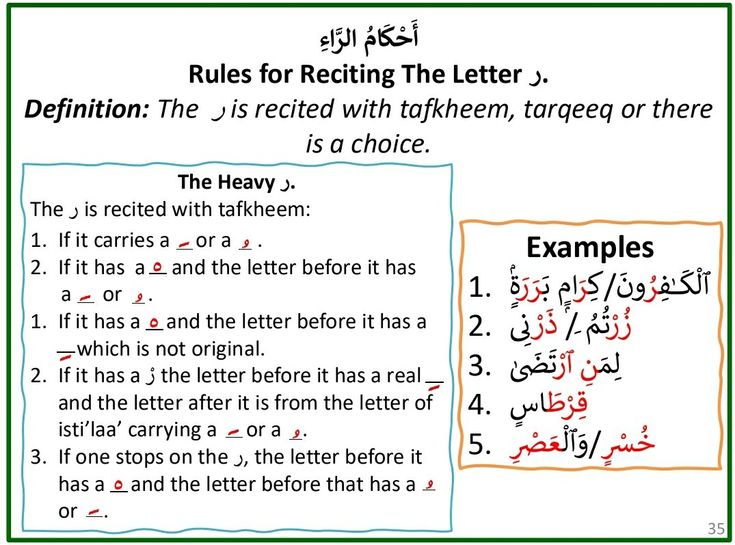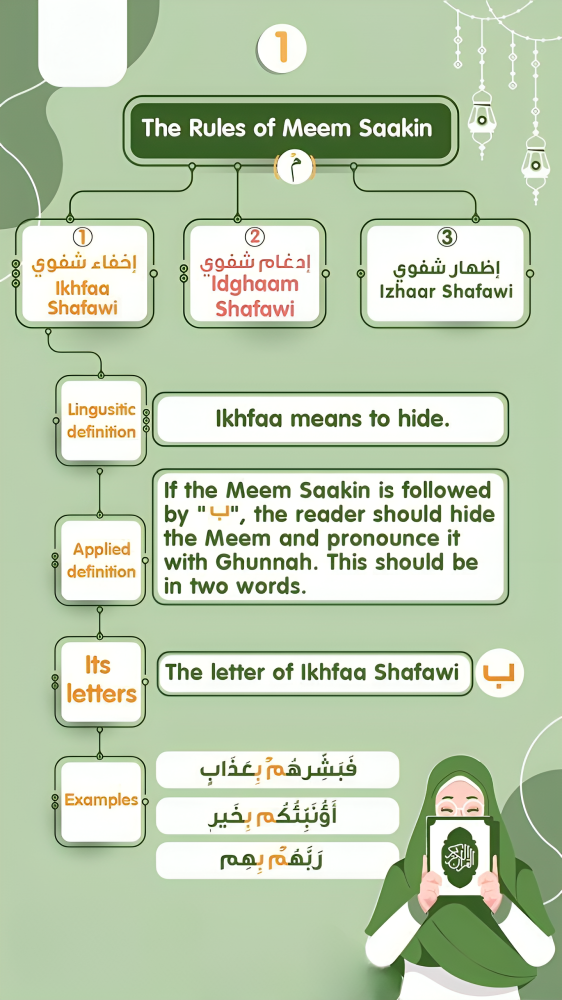Ra (ر)
In Tajweed (the science of Quranic recitation), the letter “Ra” (ر) can be pronounced either heavily (Tafkheem) or lightly (Tarqeeq), depending on the vowel or the surrounding letters. This lesson explains the rules for when Ra should be pronounced heavy or light with detailed Quranic examples.
A. Heavy Ra (Tafkheem)
Heavy Ra is pronounced with a “full mouth” sound, similar to a deep, bold pronunciation.
- If the Ra has Fathah ( ـَ )
When Ra has a Fathah (an “a” sound on top), it is pronounced heavily.
Example:- رَبَكَ (Quran 96:3)
In this word, the Ra has a Fathah, so it is pronounced heavily.
- رَبَكَ (Quran 96:3)
- If the Ra has Dammah ( ـُ )
When Ra has a Dammah (an “u” sound on top), it is also pronounced heavily.
Example:- رُسُلُ (Quran 2:87)
Here, the Ra has a Dammah, so the Ra is pronounced with a heavy sound.
- رُسُلُ (Quran 2:87)
- If the Ra has double Fathah ( ـً )
When Ra has Tanween Fathah (a double “a” sound), it is pronounced heavily.
Example:- نَذِيرًا (Quran 25:51)
The Ra has double Fathah, so it is pronounced heavily.
- نَذِيرًا (Quran 25:51)
- If the Ra has double Dammah ( ـٌ )
Similarly, if Ra has Tanween Dammah (a double “u” sound), it is pronounced heavily.
Example:- غَفُورٌ (Quran 2:173)
The Ra has double Dammah, so it is pronounced with a full mouth.
- غَفُورٌ (Quran 2:173)
- If there is a Fathah before Ra Saakin (رْ)
When Ra is Saakin (has a Sukoon, or no vowel), and it is preceded by a letter with a Fathah, the Ra is pronounced heavily.
Example:- مَرْوَة (Quran 2:158)
In this word, Ra is Saakin and is preceded by a Fathah on the letter “Meem.” Therefore, Ra is heavy.
- مَرْوَة (Quran 2:158)
- If there is a Dammah before Ra Saakin (رْ)
When Ra is Saakin, and the letter before it has a Dammah, the Ra is pronounced heavily.
Example:- قُرْآن (Quran 2:185)
Here, Ra is Saakin, and the preceding letter (Qaf) has a Dammah, so Ra is heavy.
- قُرْآن (Quran 2:185)
- If Ra is Saakin and the preceding letter is also Saakin (except Ya Saakin), and the preceding letter has Fathah
When Ra (ر) is Sākin, and the letter before it is also Sākin, and that letter is not Yā, and the letter before that carries a Fatḥah, then Ra is pronounced heavy (مُفَخَّم).
Example:- وَاصْبِرْ (Qur’an 18:28)
- In this word:
- Ra (ر) is Sākin
- The preceding letter Bā (ب) is Sākin
- The letter before Bā (Ṣād ص) has a Fatḥah
- Therefore, Ra is pronounced heavy.
- If Ra is Saakin and the preceding letter is also Saakin (except Ya Saakin), and the preceding letter has Dammah
Similar to the previous rule, but now the letter before the two Saakin letters has a Dammah.
Example:- نُذْرٌ (Quran 54:18)
In this case, Ra is Saakin, the previous letter is Saakin, and the letter before that has Dammah, so Ra is heavy.
- نُذْرٌ (Quran 54:18)
- If Ra is Saakin and the preceding letter has a Kasrah but the following letter in the same word is one of these seven letters (خ ص ض ط ظ غ ق)
Normally, Ra after a Kasrah would be light, but if one of these seven “heavy” letters (خ ص ض ط ظ غ ق) follows in the same word, Ra remains heavy.
Example:- حِمْرَة
The Ra in this word is followed by the letter “ط” in the same word, so despite the Kasrah before it, Ra is pronounced heavily.
- حِمْرَة
- If Ra is Saakin and the preceding letter has a temporary Kasrah on it
If Ra is Saakin and the letter before it has a temporary Kasrah, Ra is pronounced heavily.
Example:
- فَاصْبِرْ (Quran 74:7)
In this verse, the letter before Ra has a temporary Kasrah, but Ra is pronounced heavily.
- If Ra is Sākin and the preceding letter has Kasrah, but Ra and the Kasrah are not in the same word
When Ra (ر) is Sākin, and there is a Kasrah before it, but the Kasrah is in a different word, then Ra is still pronounced heavily (مُفَخَّم).
This is because the lightening rule only applies when the Kasrah is in the same word.
Example:
- إِنَّ رَبَّكُمْ (Qur’an 11:14)
- In this phrase:
- The Ra (ر) in رَبَّكُمْ is Sākin due to the shaddah (first part of the shaddah is Sākin).
- The Kasrah is on the previous word إِنَّ.
- Since the Kasrah and the Ra are not in the same word, the rule of light Ra does not apply.
- Therefore, Ra is pronounced heavily.
B. Soft Ra (Tarqeeq)
Soft Ra is pronounced lightly, with a thinner sound, similar to how “R” is pronounced in many other languages.
- If Ra has Kasrah ( ـِ )
When Ra has a Kasrah (an “i” sound below), it is pronounced lightly.
Example:- رِزْقًا (Quran 2:172)
In this word, Ra has a Kasrah, so it is pronounced lightly.
- رِزْقًا (Quran 2:172)
- If Ra has double Kasrah ( ـٍ )
When Ra has Tanween Kasrah (double “i” sound), it is also pronounced lightly.
Example:- خَيْرٍ (Quran 2:197)
The Ra here has a double Kasrah and is pronounced softly.
- خَيْرٍ (Quran 2:197)
- If Ra Saakin is after Kasrah, and the following letter is not one of the seven heavy letters (خ ص ض ط ظ غ ق)
If Ra is Saakin and is preceded by a letter with Kasrah, and the letter after Ra is not one of the heavy letters, Ra is pronounced lightly.
Example:- شِرْبَة (Quran 2:60)
Here, Ra is Saakin and is preceded by a Kasrah. Since the following letter is not one of the heavy ones, Ra is pronounced softly.
- شِرْبَة (Quran 2:60)
- If Ra Saakin is after Ya Saakin (while stopping)
When Ra Saakin follows Ya Saakin, Ra is pronounced lightly, especially if there is a pause (Waqf).
Example:- خَيْرٌ (Quran 3:110)
Here, Ra is preceded by Ya Saakin, so it is pronounced softly when stopping.
- خَيْرٌ (Quran 3:110)
- If Ra is Saakin and the preceding letter is also Saakin, and the preceding letter has Kasrah
When Ra is Saakin and the letter before it is Saakin, but that preceding letter has Kasrah, Ra is pronounced lightly.
Example:- مِصْرٌ (Quran 12:21)
Ra is Saakin, and the letter before it has Kasrah, so Ra is light.
- مِصْرٌ (Quran 12:21)
- If Ra has Kasrah and a stop is made with Rawm
If Ra has Kasrah and you stop at the word with Rawm (soft pronunciation while stopping), Ra remains light.
Example:- يَحْذَرُ (Quran 2:196)
Ra is pronounced lightly if you stop with Rawm.
- يَحْذَرُ (Quran 2:196)
- If Ra is in the word بِسْرَ
When Ra is in this word from (41:11), it is pronounced lightly due to the Kasrah before it.
Shifting Alif (Imaalah)
Shifting Alif toward Ya or shifting Fathah toward Kasrah is known as Imaalah. The sound of Ra in this context is pronounced like “Ray” in English.






3 Responses
please check the examples of point 7 and 11. there is an error.
Ok Sir
Please Check